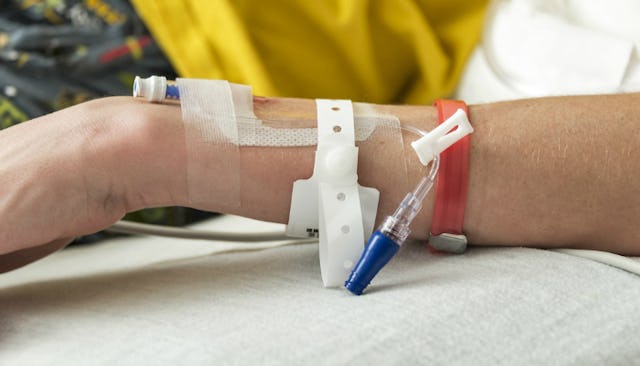5 Reasons My Chronic Disease Sucks

I’ve been a needle-bearing, vial-carrying, blood-dripping diabetic for nine years now. My disease: type 1 diabetes. My title: autoimmune warrior bad ass. Despite my can-do attitude, my resilience and determination, and an incredible support system, having a chronic disease sucks. Here’s why:
1. My disease is invisible.
Unless you notice the pager-size device clipped to my waistband and know it’s an insulin pump rather than assuming I wear my cell phone like Dwight Schrute from The Office, you wouldn’t know I have diabetes. I don’t wear any “I’m so sweet…literally” T-shirts that advertise my condition. My medical ID bracelet looks more like a chunky Pandora bracelet than a “please don’t let me die” reminder to emergency medical attendants.
Because I have a silent, invisible disease, I often feel silenced and invisible when my blood sugars are high (rendering me feeling as if Kim Kardashian’s tush slapped me in the face 20 times) or low (when I’m as jittery as a mom who lives on Red Bull). I refuse to be that annoying friend who acts like every little illness is the end of the world. I won’t bait you with vague Facebook posts or tweets. I just press on, invisibly.
2. My disease is stereotyped.
How many times have I heard, “Oh, my grandma has diabetes! She takes pills. Do you take pills?” or “My Uncle Jerry had his foot amputated because of his diabetes”? Thank you. Thank you for sharing your gory diabetic horror stories. There are several types of diabetes. The type I have is an autoimmune disease (only about 5 percent of diabetics have my type). The type your Uncle Jerry and your grandma have is type 2; it is the most common type of diabetes. No, eating sugar didn’t cause my diabetes; no, there isn’t a cure (I wish), and I hope that my kidneys, eyesight and feet are around for a long, long time. But thanks for thinking of me.
3. My disease is audited.
“Should you eat that?” or “Can you eat that?” I’m asked as I snag a piece of orangey, sweet pumpkin pie at Thanksgiving. “I bet you drink diet soda,” someone else might sanctimoniously assume. No! I hate diet soda (it tastes like mouthwash), sugar-free Jell-O (anything that wobbles like that isn’t going in my mouth) and angel food cake (nothing heavenly about that shit). All it takes to have a better understanding of type 1 diabetes is a good old Google search. Please leave me alone as I joyfully listen to the dispenser swirl the whipped cream onto my pie.
4. My disease is a burden.
I live with my diabetes 24/7/365, and it’s a lot to mull over. Knowing that every ounce of food I eat (or do not eat), every bit of physical activity, the weather, my stress level, the amount of sleep I get, how often I go to the doctor, and when I take my insulin and how much insulin I take can make or break how my day goes and the length of my lifespan is incredibly daunting and cumbersome. It’s no wonder that many chronic disease patients are clinically depressed. I have to make calculated, intentional choices if I want to stay healthy. And you thought the Real Housewives had problems.
5. My disease yields (ridiculous) personal reactions.
I cannot count the number of times someone who has learned of my disease starts with, “Do you have to give yourself shots?!” When I verify that yes, sometimes I do inject insulin, but I usually utilize my insulin pump (a device hooked up to my body around-the-clock), the follow up is, “I could never give myself a shot! Like, ever!” If it meant giving yourself a shot or dying an excruciating and preventable death, I bet you could plunge the needle into your stomach flab. I get that you’re impressed by my ability to stab myself with sharp objects and extract blood from my fingertips, but I’d appreciate it if you kept your enthusiasm to a minimum. I have my own drama to deal with.
Having a forever-disease can be daunting, intimidating and exhausting, but there are glimmers of hope. Surrounding myself with encouraging family and friends, giving myself (daily) grace and remembering that being diabetic is a part of me, but it isn’t my entirety. Type 1 diabetes will never stop being a burden, and likewise, I won’t stop fighting.
This article was originally published on